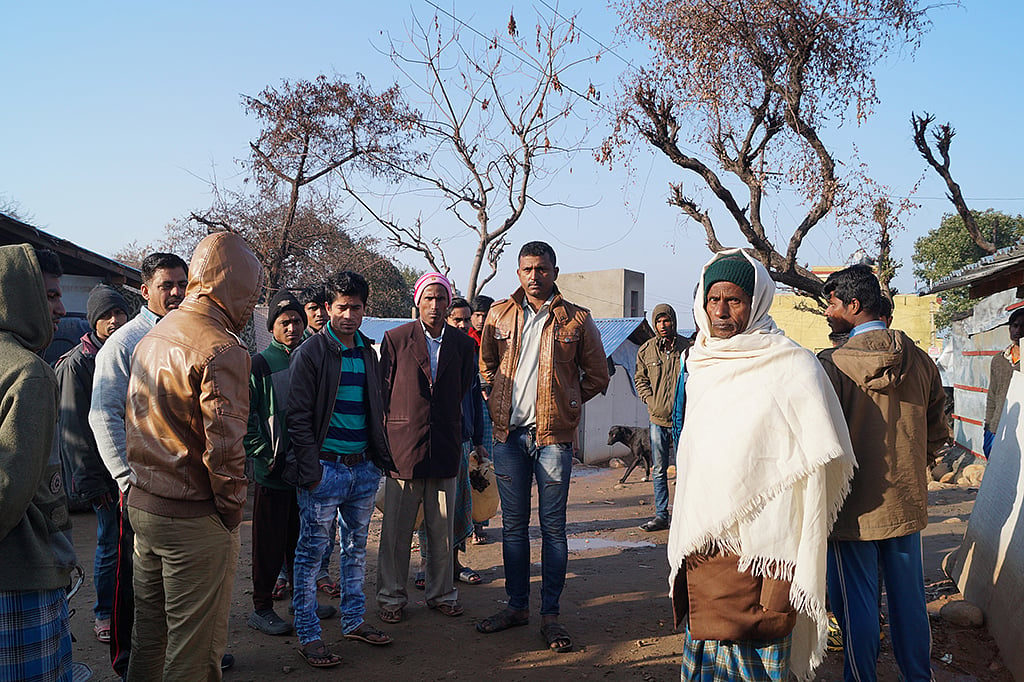‘Quit Jammu’: Billboards target Rohingya, Bangladeshi refugees
While there is international focus on Rohingyas fleeing Myanmar into Bangladesh, hoardings have come up in Jammu to ‘throw out’ the Rohingyas settled here for a decade and more

“We’re living here for over 10 years now....How come we’ve become unwanted all of a sudden?” wonders a visibly disturbed Mohammad Yasin (35), sitting in his small shop surrounded by slums at a Rohingya Basti in Narwal area of Jammu and Kashmir’s winter capital city.
“Ask any local resident in our neighbourhood if they’ve any complaint against us. No, they absolutely don’t have any! In fact, when last year many of our shanties got burnt down, they were the first to come to our rescue and aid,” Yasin claims—and the local shopkeepers in the area corroborate his version.
Yasin fled his home in Myanmar to escape the wave of attacks by majority Buddhist mobs, along with his wife. He is one among 5,743 Burmese nationals scattered on the peripheries of Jammu city. The reason behind renewed worries of refugees like Yasin is an ongoing hate campaign—which has started gathering momentum, stoking xenophobia.
‘Let us all Jammuites unite to save history, culture and identity of Dogras’: reads a giant billboard put up by Jammu and Kashmir National Panthers Party (JKNPP)—which couldn’t win even a single seat in last assembly elections, near Dogra Chowk in the heart of city, exhorting, “Wake up Jammu.”

Independent observers, however, accuse JKNPP of “exploiting a humanitarian crisis” to revive its dwindling political fortunes in state politics. They claim that Jammu region—which has been home to tens of thousands of war refugees from Pakistan besides several other militancy-induced internally displaced persons including Kashmiri Pandits—has always been hospitable to the displaced.
The recent diktat warning Rohingya and Bangladeshi refugees has followed the rejection of a resolution demanding their deportation, in Jammu and Kashmir’s Legislative Council last month.
Ironically, the resolution was moved by a member of the BJP—which otherwise seems obsessed with revocation of Article 370, but in this case cited the special constitutional status of the state and its State Subject Laws. “Don’t make it (refugee settlement) a central government issue,” a visibly upset BJP leader, Vinod Gupta reportedly said in the Legislative Council.

Chamber of Commerce and Industry Jammu—which is said to be unhappy with the coalition government which is accused of ignoring its several long-standing demands—has also been very vociferous on the issue. Claiming that these refugees have been settled in violation of Article 370 and have allegedly been threatening Jammu’s demography, the trade body has accused the government of adopting "double standards" when it came to having a Sainik Colony and separate Kashmiri Pandit township in the Valley.
“As on January 6, 322 foreigners besides 13,433 Burmese and Tibetans are staying in Jammu and Kashmir,” Chief Minister Mehbooba Mufti said in a written reply to a question by BJP MLA Rajesh Gupta in the Legislative Assembly last month, adding that the foreign nationals entered Jammu and Kashmir on their own and have settled in Jammu and Samba district.
“While 7,093 foreigners were staying in the state in 2008, the number increased to 12,560 in 2014 and 13,755 in 2016. Of these 5,743 people are Burmese nationals (Rohingyas), 7,690 people are Tibetans and 322 are other foreigners.”
Describing Rohingya refugees as a “threat to Jammu’s security”, the state unit of Vishwa Hindu Parishad has demanded that they be “thrown out of the state.” Some right wing leaders in their press-statements even link terror attacks at Nagrota, Samba and other places to the refugees.
“We’re living here for over 10 years now....How come we’ve become unwanted all of a sudden?” wonders a visibly disturbed Mohammad Yasin. Yasin fled his home in Myanmar to escape the wave of attacks by majority Buddhist mobs. He is one among 5,743 Burmese nationals scattered on the peripheries of Jammu city. The reason behind renewed worries of refugees like Yasin is an ongoing hate campaign—which has started gathering momentum, stoking xenophobia
Ironically, reporting in a section of media are also fuelling the hate campaign against refugees despite Chief Minister’s statement in the assembly that “no Rohingya has been found involved in militancy-related incidents in the state.”
Without several basic rights and facilities, these refugees live in obscure and stinking corners of the city, rented out by Jammu locals; and do menial jobs for sustenance. “How can we pose threat to somebody or dwell on illegal activities,” says another refugee, Rabi-ul-Alam (25), adding, that he and other refugees came to Jammu because of higher wages and labour demand.
“First, we’re hounded out of Myanmar and then Bangladesh. Thereafter, we somehow landed in India—and started wandering from one state to the other before we reached Jammu,” he says, before reacting to the ongoing hate campaign: “We’ll leave this place after things begin to normalise in our home country—thereafter, we won’t stay here even if someone offers us crores of rupees.”
The story was updated at 12.55 pm to replace ‘assembly’ with ‘the Legislative Council’ in para 7 and ‘Council’ with ‘Assembly in para 9.
Follow us on: Facebook, Twitter, Google News, Instagram
Join our official telegram channel (@nationalherald) and stay updated with the latest headlines
- BJP
- Bangladesh
- Pakistan
- Jammu and Kashmir
- Mehbooba Mufti
- Kashmiri pandits
- J&K
- Nagrota
- Jammu
- J&K Chief Minister
- Vishwa Hindu Parishad
- refugees
- Rohingya
- Myanmar
- Narwal
- Buddhist
- Burmese
- Dogras
- Jammu and Kashmir National Panthers Party
- JKNPP
- Article 370
- Vinod Gupta
- Chamber of Commerce and Industry Jammu
- CCIJ
- Sainik Colony
- Tibetans
- Samba